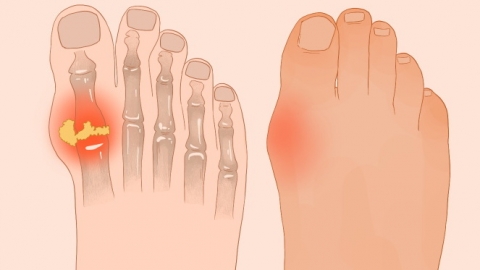What foods should people with gout avoid?
Generally, patients with gout need to strictly control their diet and medication. It is not recommended to consume animal offal, seafood hot pot, concentrated meat broth, beer, or fructose-containing beverages. Medication should be taken under medical guidance; it is not advised to take aspirin enteric-coated tablets, hydrochlorothiazide tablets, pyrazinamide tablets, niacin tablets, or furosemide tablets on one's own. Detailed explanations are as follows:
1. Foods
1. Marinated Pork Liver
Marinated pork liver is a high-purine food. Purines are metabolized into uric acid in the body. Gout patients have reduced ability to excrete uric acid, and consumption of such foods can easily lead to a sharp increase in blood uric acid levels, possibly triggering an acute gout attack, causing symptoms such as redness, swelling, and pain in the joints. Therefore, it is not recommended.
2. Seafood Hot Pot
Seafood hot pot ingredients such as shrimp, crab, and shellfish contain high levels of purines. Additionally, the broth of the hot pot, after prolonged cooking, becomes concentrated with purines. When consumed with high-purine dipping sauces, this dual effect significantly increases uric acid production, easily triggering gout and being detrimental to disease control. Therefore, it must be avoided.

3. Concentrated Meat Broth
During prolonged stewing, purines in the meat dissolve extensively into the broth, resulting in purine levels in the broth much higher than those in the meat itself. Drinking this broth can rapidly elevate blood uric acid levels in gout patients, possibly triggering a gout attack. Therefore, drinking concentrated meat broth is not recommended.
4. Beer
Beer produces large amounts of purines during fermentation, and alcohol inhibits uric acid excretion. This dual effect raises blood uric acid levels and is a common trigger for gout. Drinking beer may quickly cause joint pain in gout patients; therefore, beer consumption must be strictly avoided.
5. Fructose Beverages
Fructose beverages contain large amounts of high-fructose corn syrup. Fructose metabolism in the body accelerates purine synthesis, increasing uric acid production, while also potentially reducing uric acid excretion. Long-term consumption easily leads to sustained elevation of blood uric acid levels, worsening gout and being detrimental to uric acid control. Therefore, drinking such beverages is not recommended.
II. Medications
1. Aspirin Enteric-coated Tablets
Low-dose aspirin may inhibit the excretion of uric acid by the renal tubules, leading to elevated blood uric acid levels. Especially during an acute gout attack, taking aspirin may worsen the condition. If required for underlying conditions, dosage adjustments and uric acid monitoring should be conducted under a doctor's guidance; self-administration is not recommended.
2. Hydrochlorothiazide Tablets
This is a diuretic; long-term use reduces uric acid excretion, causing uric acid accumulation in the body, elevating blood uric acid levels, which may trigger or exacerbate gout. If gout patients require diuretics, they should consult a doctor to choose medications with minimal impact on uric acid; self-administration is not recommended.
3. Pyrazinamide Tablets
Commonly used for anti-tuberculosis treatment, its metabolites inhibit uric acid excretion, elevating blood uric acid levels. Gout patients taking this medication are highly susceptible to acute gout attacks. The decision to use it must be made after a doctor's evaluation, and uric acid-lowering measures should be taken concurrently; self-administration is not recommended.
4. Niacin Tablets
Although niacin can regulate blood lipids, high-dose intake reduces uric acid excretion, leading to elevated blood uric acid levels, which may trigger gout. If gout patients need to regulate blood lipids, they should choose medications that do not affect uric acid; self-administration of niacin tablets is not recommended.
5. Furosemide Tablets
This is a potent diuretic that accelerates water excretion from the body while simultaneously reducing uric acid excretion, leading to elevated blood uric acid concentrations. Gout patients taking this medication may experience gout attacks and must use it cautiously under medical guidance; self-administration is not recommended.
In daily life, a low-purine diet should also be maintained, and drinking plenty of water helps promote uric acid excretion. Vigorous exercise and exposure to cold should be avoided. Gout patients should inform their doctors of their medical history before taking any medication. If joint pain or other discomfort occurs, prompt medical attention is necessary. Strict adherence to medical advice for treatment is essential; self-adjustment of diet or medication must be avoided.




